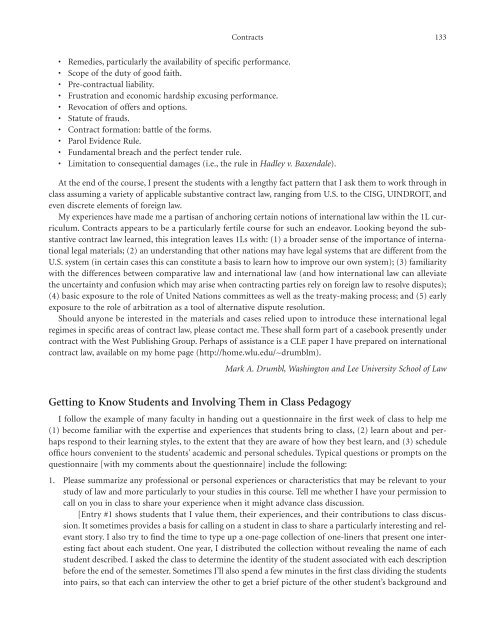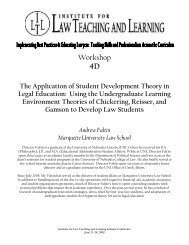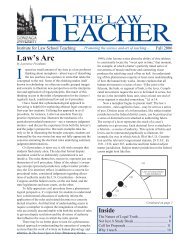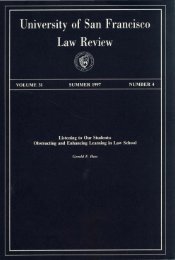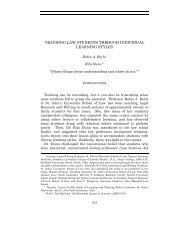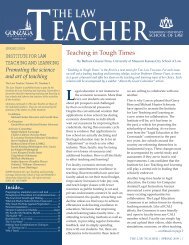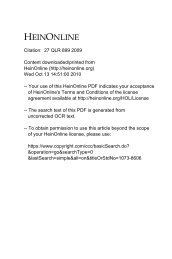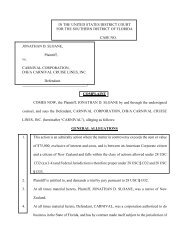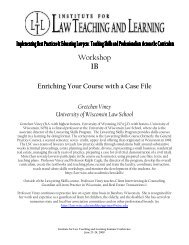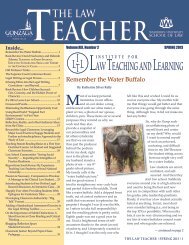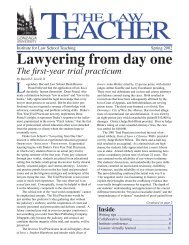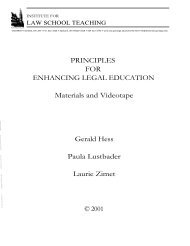- Page 1:
Teaching the Law School Curriculum
- Page 4 and 5:
Copyright 2004 Steven Friedland and
- Page 7 and 8:
Contents Contributors xxv Preface x
- Page 9 and 10:
Contents ix Exercises 37 Collaborat
- Page 11 and 12:
Contents xi Problem Solving and Sto
- Page 13 and 14:
Contents xiii Exercises 141 A Contr
- Page 15 and 16:
Contents xv Motions to Suppress Evi
- Page 17 and 18:
Contents xvii Chapter 9 Family Law
- Page 19 and 20:
Contents xix Individualized Instruc
- Page 21 and 22:
Contents xxi Brief Gems 308 Reading
- Page 23 and 24:
Contents xxiii Repossessing Cars an
- Page 25 and 26:
Alschuler, Albert W., 179 Anderson,
- Page 27 and 28:
Kirwin, Ken, 270 Kisthardt, Mary Ka
- Page 29:
Preface This book is a teaching res
- Page 33 and 34:
chapter 1 Business Associations Int
- Page 35 and 36:
Business Associations 5 Introductio
- Page 37 and 38:
Business Associations 7 I have deve
- Page 39 and 40:
Business Associations 9 a tragedy s
- Page 41 and 42:
Business Associations 11 the studen
- Page 43 and 44:
Surviving, Dealing, and Laughing Bu
- Page 45:
Business Associations 15 Although I
- Page 48 and 49:
18 Civil Procedure Handouts — Pri
- Page 50 and 51:
20 Civil Procedure stronger sense t
- Page 52 and 53:
22 Civil Procedure Supplemental Jur
- Page 54 and 55:
24 Civil Procedure Another experime
- Page 56 and 57:
26 Civil Procedure TEACHING IMPORTA
- Page 58 and 59:
28 Civil Procedure JOHN H. MITCHELL
- Page 60 and 61:
30 Civil Procedure Concept Sheets I
- Page 62 and 63:
32 Civil Procedure Medical exam The
- Page 64 and 65:
34 Civil Procedure Annotated Rule 1
- Page 66 and 67:
36 Civil Procedure baseball, your m
- Page 68 and 69:
38 Civil Procedure No Joinder Probl
- Page 70 and 71:
40 Civil Procedure Joinder Hot Pota
- Page 72 and 73:
42 Civil Procedure Complaint Drafti
- Page 74 and 75:
44 Civil Procedure excellent oral a
- Page 76 and 77:
46 Civil Procedure about your Civil
- Page 78 and 79:
48 Civil Procedure exam may be admi
- Page 81 and 82:
chapter 3 Clinical Law Approach 53
- Page 83 and 84:
Clinical Law 53 Approach Clinical L
- Page 85 and 86:
Clinical Law 55 selor-at-Law: A Col
- Page 87 and 88:
Clinical Law 57 office. Work to ame
- Page 89 and 90:
Clinical Law 59 3. An Intoxicated U
- Page 91 and 92:
Clinical Law 61 cise is designed to
- Page 93 and 94:
6. Evaluation 5. Action Plan Clinic
- Page 95 and 96:
Clinical Law 65 Appendix C 6 Ways t
- Page 97 and 98:
Mirror, Mirror: Using Non-Tradition
- Page 99 and 100:
Clinical Law 69 lawyer’s craft. R
- Page 101 and 102:
Clinical Law 71 After the students
- Page 103 and 104:
Clinical Law 73 Isolating rhetorica
- Page 105 and 106:
Clinical Law 75 to course content.
- Page 107 and 108:
Clinical Law 77 To achieve the opti
- Page 109:
Other professional communications:
- Page 112 and 113: 82 Constitutional Law Employing the
- Page 114 and 115: 84 Constitutional Law Introduction
- Page 116 and 117: 86 Constitutional Law 4. To learn t
- Page 118 and 119: 88 Constitutional Law the Constitut
- Page 120 and 121: 90 Constitutional Law tions of the
- Page 122 and 123: 92 Constitutional Law Sinai Israel
- Page 124 and 125: 94 Constitutional Law selves, and n
- Page 126 and 127: 96 Constitutional Law Gordon Wood
- Page 128 and 129: 98 Constitutional Law the focus of
- Page 130 and 131: 100 Constitutional Law The biggest
- Page 132 and 133: 102 Constitutional Law formation of
- Page 134 and 135: 104 Constitutional Law from Orlando
- Page 136 and 137: 106 Constitutional Law Professor: W
- Page 138 and 139: 108 Constitutional Law When dealing
- Page 140 and 141: 110 Constitutional Law ance; moving
- Page 142 and 143: 112 Constitutional Law That exercis
- Page 144 and 145: 114 Constitutional Law Casebook and
- Page 146 and 147: 116 Constitutional Law On Discrimin
- Page 148 and 149: 118 Constitutional Law in class. St
- Page 150 and 151: 120 Constitutional Law sity (http:/
- Page 152 and 153: 122 Constitutional Law jected, and
- Page 154 and 155: 124 Constitutional Law The Second A
- Page 156 and 157: 126 Constitutional Law for example
- Page 159 and 160: chapter 5 Contracts Approach 131 Le
- Page 161: Contracts 131 Approach Learning abo
- Page 165 and 166: Dear Mom: I promise to give you my
- Page 167 and 168: Contracts 137 Material Teaching Con
- Page 169 and 170: Contracts 139 cial choices. I also
- Page 171 and 172: Contracts 141 To help address these
- Page 173 and 174: Contracts 143 tion, parol evidence,
- Page 175 and 176: Contracts 145 When we met in the cl
- Page 177 and 178: Contracts 147 Case #1: Disappointed
- Page 179 and 180: SCRIPT THREE: Contracts 149 CHRIS:
- Page 181 and 182: Contracts 151 strating that within
- Page 183 and 184: chapter 6 Criminal Law Approach 155
- Page 185 and 186: Criminal Law 155 Approach Introduct
- Page 187 and 188: Criminal Law 157 my students intend
- Page 189 and 190: Criminal Law 159 dents whose challe
- Page 191 and 192: Criminal Law 161 Pulp Fiction. Exce
- Page 193 and 194: Criminal Law 163 Dudley — a crew
- Page 195 and 196: Criminal Law 165 of the leading sch
- Page 197 and 198: Criminal Law 167 The Set Up. During
- Page 199 and 200: Criminal Law 169 As a clinician, I
- Page 201 and 202: Criminal Law 171 clarify materials
- Page 203 and 204: Criminal Law 173 penal code section
- Page 205 and 206: chapter 7 Criminal Procedure Introd
- Page 207 and 208: Criminal Procedure 177 Introduction
- Page 209 and 210: Criminal Procedure 179 was unaware
- Page 211 and 212: Criminal Procedure 181 policies and
- Page 213 and 214:
Motivating Students to Read Statute
- Page 215 and 216:
. What is the maximum possible sent
- Page 217 and 218:
chapter 8 Evidence Introduction Ste
- Page 219 and 220:
Evidence 189 Introduction For many
- Page 221 and 222:
Evidence 191 fact that our students
- Page 223 and 224:
Evidence 193 ing skills professors,
- Page 225 and 226:
Evidence 195 text of] a Rule,” th
- Page 227 and 228:
Evidence 197 in the syllabus given
- Page 229 and 230:
Evidence 199 propensity to lie. The
- Page 231 and 232:
My Cousin Vinny, Revisited Evidence
- Page 233 and 234:
First-Day Exercises Evidence 203 Ex
- Page 235 and 236:
Storytelling in the Classroom Evide
- Page 237 and 238:
Teaching Hearsay through Role Play
- Page 239 and 240:
Cartoons, Captions, and Mnemonics o
- Page 241 and 242:
chapter 9 Family Law Approach 213 W
- Page 243 and 244:
Family Law 213 Approach Why I Use P
- Page 245 and 246:
Family Law 215 One area of the cour
- Page 247 and 248:
Family Law 217 • “Merry Musings
- Page 249 and 250:
Family Law 219 We then turn to the
- Page 251 and 252:
Family Law 221 can integrate studen
- Page 253 and 254:
Family Law 223 that was in the oven
- Page 255 and 256:
Family Law 225 The first in-class e
- Page 257:
Family Law 227 high school. She con
- Page 260 and 261:
230 Federal Income Tax Brief Gems 2
- Page 262 and 263:
232 Federal Income Tax 4. Perfect w
- Page 264 and 265:
234 Federal Income Tax with respect
- Page 266 and 267:
236 Federal Income Tax out the seme
- Page 268 and 269:
238 Federal Income Tax Sources of T
- Page 270 and 271:
240 Federal Income Tax Section 1001
- Page 272 and 273:
242 Federal Income Tax Section 1015
- Page 274 and 275:
244 Federal Income Tax Gains from D
- Page 276 and 277:
246 Federal Income Tax Computing Ta
- Page 278 and 279:
248 Federal Income Tax Exercises In
- Page 280 and 281:
250 Federal Income Tax Getting the
- Page 282 and 283:
252 Federal Income Tax Research Pap
- Page 284 and 285:
254 Legal Research and Writing The
- Page 286 and 287:
256 Legal Research and Writing stri
- Page 288 and 289:
258 Legal Research and Writing Thes
- Page 290 and 291:
260 Legal Research and Writing law
- Page 292 and 293:
262 Legal Research and Writing The
- Page 294 and 295:
264 Legal Research and Writing The
- Page 296 and 297:
266 Legal Research and Writing [The
- Page 298 and 299:
268 Legal Research and Writing Exer
- Page 300 and 301:
270 Legal Research and Writing in a
- Page 302 and 303:
272 Legal Research and Writing pros
- Page 304 and 305:
274 Legal Research and Writing Larg
- Page 306 and 307:
276 Legal Research and Writing frie
- Page 308 and 309:
278 Legal Research and Writing all,
- Page 310 and 311:
280 Legal Research and Writing cifi
- Page 312 and 313:
282 Legal Research and Writing dent
- Page 314 and 315:
284 Legal Research and Writing part
- Page 316 and 317:
286 Legal Research and Writing conn
- Page 318 and 319:
288 Legal Research and Writing serv
- Page 320 and 321:
290 Professional Responsibility Bri
- Page 322 and 323:
292 Professional Responsibility Sol
- Page 324 and 325:
294 Professional Responsibility 1.6
- Page 326 and 327:
296 Professional Responsibility ali
- Page 328 and 329:
298 Professional Responsibility Rol
- Page 330 and 331:
300 Professional Responsibility •
- Page 332 and 333:
302 Professional Responsibility The
- Page 334 and 335:
304 Professional Responsibility be
- Page 336 and 337:
306 Professional Responsibility Kla
- Page 338 and 339:
308 Professional Responsibility MPR
- Page 340 and 341:
310 Professional Responsibility to
- Page 342 and 343:
312 Professional Responsibility tic
- Page 345 and 346:
chapter 13 Property Introduction St
- Page 347 and 348:
Property 317 Introduction Property
- Page 349 and 350:
Property 319 The description of pro
- Page 351 and 352:
Teaching Property through the Probl
- Page 353 and 354:
Property 323 copied them. I re-read
- Page 355 and 356:
Property 325 already do that. I add
- Page 357 and 358:
Property 327 cause the student know
- Page 359 and 360:
Property 329 Table of Determining L
- Page 361 and 362:
Negotiating a Lease Property 331 On
- Page 363 and 364:
Property 333 anticipating all relev
- Page 365 and 366:
Property 335 Everything I Needed to
- Page 367 and 368:
Property 337 be law on the subject
- Page 369 and 370:
Property 339 Difficulty Paper In or
- Page 371 and 372:
Property 341 hitting practice shots
- Page 373 and 374:
chapter 14 Sales and Secured Transa
- Page 375 and 376:
We Are All Debtors and Creditors Sa
- Page 377 and 378:
Sales and Secured Transactions 347
- Page 379 and 380:
Sales and Secured Transactions 349
- Page 381 and 382:
Sales and Secured Transactions 351
- Page 383 and 384:
Sales and Secured Transactions 353
- Page 385 and 386:
Which Intrinsic Evidence Is Admissi
- Page 387 and 388:
No K No Performance? No K by writin
- Page 389 and 390:
Potential Recovery Theories in Sale
- Page 391 and 392:
Borrower/Lender Role Play to Begin
- Page 393 and 394:
Sales and Secured Transactions 363
- Page 395 and 396:
Sales and Secured Transactions 365
- Page 397:
Secured Transactions Exam Format Sa
- Page 400 and 401:
370 Torts Brainstorming Technique t
- Page 402 and 403:
372 Torts Duty First is comprehensi
- Page 404 and 405:
374 Torts look back at the notes th
- Page 406 and 407:
376 Torts The wise selection and ar
- Page 408 and 409:
378 Torts The Moral Perversity of t
- Page 410 and 411:
380 Torts Tarasoff v. Regents of Un
- Page 412 and 413:
382 Torts (Star Trek, Star Trek: Th
- Page 414 and 415:
384 Torts also are designed so the
- Page 416 and 417:
386 Torts Teaching Palsgraf Most to
- Page 418 and 419:
388 Torts The Restatement approach
- Page 420 and 421:
390 Torts native — earthquakes, l
- Page 422 and 423:
392 Torts I needn’t have worried.
- Page 424 and 425:
394 Index for Books The Courage of
- Page 426 and 427:
396 Index for Books The Peaceable C
- Page 428 and 429:
398 Index for Cases Casey, 111 Cohe
- Page 430 and 431:
400 Index for Cases Evidence: Dalla
- Page 432 and 433:
402 Index for Cases Hecht v. Superi
- Page 434 and 435:
404 Index for Films and TV Shows Th
- Page 436 and 437:
406 SUBJECT INDEX Films, see separa


